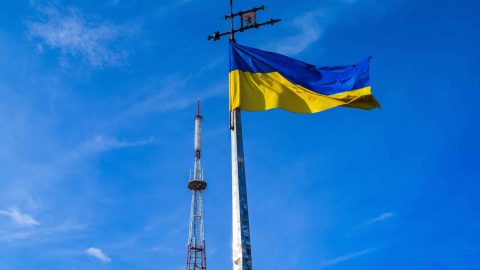Russia launched a military invasion of Ukraine on Thursday. According to media reports, military targets in Ukraine have been attacked from the air and ground. Currently, it looks like the attacks are focused on military targets or military infrastructure.
At the same time, Putin warned Western countries, which had previously imposed initial sanctions, not to intervene and openly threatened an immediate Russian response and harsh consequences. Ukraine has declared martial law.
U.S. President Joe Biden will meet with his G7 counterparts today to discuss the way forward and then address the public. In the meantime, the EU has strongly condemned the attack on Ukraine and threatened further sanctions.
Stock market declines – government bonds, gold and oil prices rise
According to the textbook, the financial markets are reacting with declines in stock prices, increases in the price of crude oil, a decline in the Russian ruble, a strengthening of the U.S. dollar, and increases in the price of credit-sensitive government bonds.
In other words, risk premiums (valuations) for geopolitical tensions, economic and inflation risks have risen. A quick solution does not seem to be in sight. Sanctions by the West may be useful in the long term, but they are unlikely to replace diplomacy in the short term. Therefore, uncertainty about further developments is likely to remain high.
The central banks’ more restrictive measures could be pushed back in time. This is because it has become more likely that central banks will at least exit the ultra-expansive stance less quickly than was thought a few days ago.
In the event of further dislocations, additional support measures (purchase programs, cheap and unlimited liquidity supply) are even likely.
Valuations for high-opportunity assets now more favorable
Equities were already in correction mode several weeks before the Ukraine crisis. Expectations of faster and stronger key rate hikes had hurt them. As a result of the renewed setbacks in the wake of the Russia-Ukraine conflict, valuations of opportunity-rich asset classes have retreated to more adequate levels.
Experience shows that equities experience sustained price declines, especially during recessions. As long as an economic downturn can be avoided, the outlook for opportunity asset classes remains cautiously positive.
Price fluctuations will persist
We expect volatility to persist in the near term as leaders weigh and announce their response to escalation. Historically, geopolitical crises have generally not prevented stock prices from moving higher over the medium term.
In the past, downturns due to geopolitical stress events have not had lasting effects in well-diversified portfolios.
Erste AM: Positions in funds and portfolios remain unchanged for the time being
Therefore, we are leaving our current positioning in our multi-asset funds and asset management portfolios unchanged for the time being. This is especially true as not all consequences, such as sanction measures or further course of military actions, are foreseeable yet.
Nevertheless, we will closely monitor the further steps of all parties to the conflict and their effects and make changes if necessary.
In our funds and portfolios, we are currently broadly diversified across asset classes, regions, sectors and currencies. In general, this allows us to reduce idiosyncratic (unsystematic) risks.
Furthermore, we also hold defensive investments that can perform positively in this environment, such as gold, U.S. dollar positions or government bonds.
Legal note:
Prognoses are no reliable indicator for future performance.
Legal disclaimer
This document is an advertisement. Unless indicated otherwise, source: Erste Asset Management GmbH. The language of communication of the sales offices is German and the languages of communication of the Management Company also include English.
The prospectus for UCITS funds (including any amendments) is prepared and published in accordance with the provisions of the InvFG 2011 as amended. Information for Investors pursuant to § 21 AIFMG is prepared for the alternative investment funds (AIF) administered by Erste Asset Management GmbH pursuant to the provisions of the AIFMG in conjunction with the InvFG 2011.
The currently valid versions of the prospectus, the Information for Investors pursuant to § 21 AIFMG, and the key information document can be found on the website www.erste-am.com under “Mandatory publications” and can be obtained free of charge by interested investors at the offices of the Management Company and at the offices of the depositary bank. The exact date of the most recent publication of the prospectus, the languages in which the fund prospectus or the Information for Investors pursuant to Art 21 AIFMG and the key information document are available, and any other locations where the documents can be obtained are indicated on the website www.erste-am.com. A summary of the investor rights is available in German and English on the website www.erste-am.com/investor-rights and can also be obtained from the Management Company.
The Management Company can decide to suspend the provisions it has taken for the sale of unit certificates in other countries in accordance with the regulatory requirements.
Note: You are about to purchase a product that may be difficult to understand. We recommend that you read the indicated fund documents before making an investment decision. In addition to the locations listed above, you can obtain these documents free of charge at the offices of the referring Sparkassen bank and the offices of Erste Bank der oesterreichischen Sparkassen AG. You can also access these documents electronically at www.erste-am.com.
Our analyses and conclusions are general in nature and do not take into account the individual characteristics of our investors in terms of earnings, taxation, experience and knowledge, investment objective, financial position, capacity for loss, and risk tolerance. Past performance is not a reliable indicator of the future performance of a fund.
Please note: Investments in securities entail risks in addition to the opportunities presented here. The value of units and their earnings can rise and fall. Changes in exchange rates can also have a positive or negative effect on the value of an investment. For this reason, you may receive less than your originally invested amount when you redeem your units. Persons who are interested in purchasing units in investment funds are advised to read the current fund prospectus(es) and the Information for Investors pursuant to § 21 AIFMG, especially the risk notices they contain, before making an investment decision. If the fund currency is different than the investor’s home currency, changes in the relevant exchange rate can positively or negatively influence the value of the investment and the amount of the costs associated with the fund in the home currency.
We are not permitted to directly or indirectly offer, sell, transfer, or deliver this financial product to natural or legal persons whose place of residence or domicile is located in a country where this is legally prohibited. In this case, we may not provide any product information, either.
Please consult the corresponding information in the fund prospectus and the Information for Investors pursuant to § 21 AIFMG for restrictions on the sale of the fund to American or Russian citizens.
It is expressly noted that this communication does not provide any investment recommendations, but only expresses our current market assessment. Thus, this communication is not a substitute for investment advice.
This document does not represent a sales activity of the Management Company and therefore may not be construed as an offer for the purchase or sale of financial or investment instruments.
Erste Asset Management GmbH is affiliated with the Erste Bank and austrian Sparkassen banks.
Please also read the “Information about us and our securities services” published by your bank.


